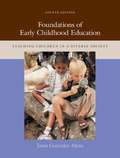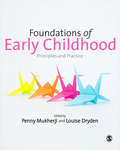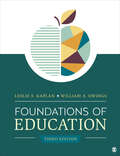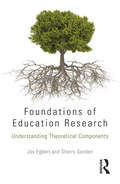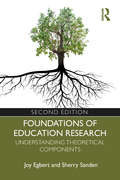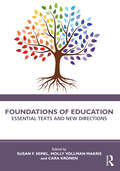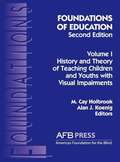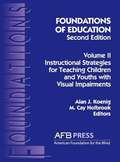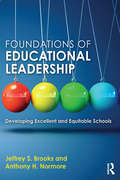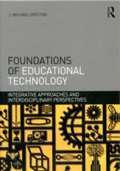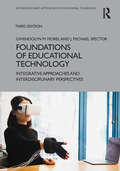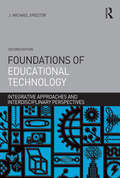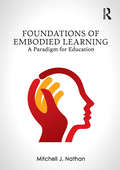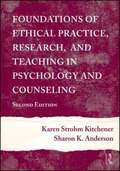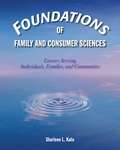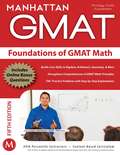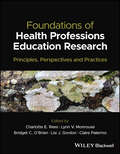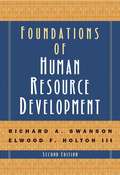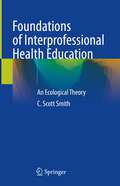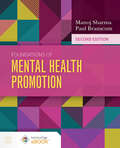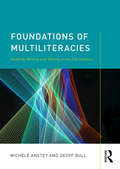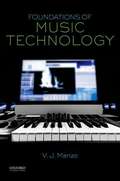- Table View
- List View
Foundations of Early Childhood Education: Teaching Children in a Diverse Society (4th Edition)
by Janet Gonzalez-MenaFoundations Of Early Childhood Education provides a practical introduction to caring for and educating children from birth to age 8. The text presents an overview of important theory grounded in the key skills new educators need to succeed - from respect for the diversities of children and families to achieving the most current NAEYC standards.
Foundations of Early Childhood: Principles and Practice
by Penny Mukherji Louise Dryden'This text will be an invaluable addition to the reading of students and tutors alike. It has been written thoughtfully for students embarking on university courses that study aspects of early childhood education. The introductory chapters give the reader a sense of the thinking and reflection that is helpful for them at the beginning of their studies and a clear focus on the rights of our youngest children roots the text in a sound pedagogical frame. The later chapters broaden the argument and feel very relevant to the current context in their explorations of the policy and practice of EYFS. I would strongly recommend this text.' -Jo Albin-Clark, Senior Lecturer in Early Years Education, Edge Hill University This book introduces all the most important aspects of early years care and education, and will help you develop the key skills needed to study at degree level. Each chapter introduces major concepts and theories which allow you to explore the foundations of key early childhood issues and apply them in practice. Topics include: Children's rights The Early Years curriculum How children learn and develop Health and well-being As well as looking at important aspects of study such as: How to search primary sources, such as policy documents and journals How to use your personal experience in studying How to develop critical reading and writing skills With specific learning features designed for different levels of study, this book will be invaluable to students studying at levels 4 and 5 of early childhood degrees and foundation degrees, with features designed to support students as they make the transition to honours level study. Digital resources for extra support! Check out the companion website for additional material including: interactive glossary flashcards journal tasks web links to more handy online resources
Foundations of Education
by Leslie Schkemmkeman Kaplan William Allen OwingsNow published by SAGE! A modern and comprehensive introduction to the field, Foundations of Education makes core topics in education accessible and personally meaningful to students pursuing a career within the education profession. In a clear and direct prose, authors Leslie S. Kaplan and William A. Owings offer readers the breadth of coverage, scholarly depth, and conceptual analysis of contemporary issues that will help them gain a realistic and insightful perspective of the field. In addition to classic coverage of foundational topics such as educational philosophy, history, reform, law, and finance, the newly-revised Third Edition features a special emphasis on social justice issues, considers key debates around today’s education trends, and underscores the theory and practice behind meeting the needs of all learners. This title is accompanied by a complete teaching and learning package.
Foundations of Education
by Leslie Schkemmkeman Kaplan William Allen OwingsNow published by SAGE! A modern and comprehensive introduction to the field, Foundations of Education makes core topics in education accessible and personally meaningful to students pursuing a career within the education profession. In a clear and direct prose, authors Leslie S. Kaplan and William A. Owings offer readers the breadth of coverage, scholarly depth, and conceptual analysis of contemporary issues that will help them gain a realistic and insightful perspective of the field. In addition to classic coverage of foundational topics such as educational philosophy, history, reform, law, and finance, the newly-revised Third Edition features a special emphasis on social justice issues, considers key debates around today’s education trends, and underscores the theory and practice behind meeting the needs of all learners. This title is accompanied by a complete teaching and learning package.
Foundations of Education Research: Understanding Theoretical Components
by Joy Egbert Sherry SandenThe theoretical components of research are some of the most complicated and challenging aspects for new researchers to understand. While relevant methodologies are routinely covered by textbooks, the theory behind the practice can remain unnecessarily opaque. In six concise chapters Foundations of Education Research defines, discusses, and provides applications for the central components of research in order to provide researchers with a common ground from which to work. Including conceptual framework, epistemology, paradigm, theory, theoretical framework, and methodology/method, this book gives students the tools they need to understand existing education research literature and to produce theoretically-grounded work of their own. Beginning each chapter with perspectives from both novice and experienced researchers, this book is designed to help students achieve a deeper understanding of what is expected of them and ideas about how to achieve it. Guiding questions from both perspectives can assist researchers who are engaging with theory for the first time and those looking to improve their understanding of the fundamentals. Practice exercises and suggested reading lists at the end of each chapter offer students resources they can apply to their own research and thinking in concrete ways. A perfect accompaniment to standard research courses, this primer demystifies the jargon of education research in practical terms.
Foundations of Education Research: Understanding Theoretical Components
by Joy Egbert Sherry SandenNow in its second edition, Foundations of Education Research defines, discusses, and offers applications for the central components of educational research, providing both novice and experienced researchers with a common ground from which to work. Fully updated throughout, the 2nd edition adds a glossary of terms, additional examples, and includes a discussion of similarities and differences in education research. Eight concise, accessible chapters cover conceptual framework, epistemology, paradigm, theory, theoretical framework, and methodology/method. This unique primer demystifies jargon and makes the theoretical components of research accessible, giving students the tools they need to understand existing education research literature and to produce theoretically-grounded work of their own. Each chapter begins with perspectives from both novice and experienced researchers, whose guiding questions assist researchers engaging with theory for the first time and those looking to improve their understanding of the fundamentals. Practice exercises, examples, and suggested reading lists at the end of each chapter offer students resources they can apply to their own research and thinking in concrete ways. A perfect accompaniment to standard research courses, this book is designed to help students achieve a deeper understanding of what is expected of them and ideas about how to achieve it.
Foundations of Education for Blind and Visually Handicapped Children and Youth Theory and Practice
by Geraldine T. SchollBlind children -- Education. Children with visual disabilities -- Education.
Foundations of Education: Essential Texts and New Directions
by Molly Vollman Makris Susan F. Semel Cara KronenFoundations of Education: Essential Texts and New Directions helps aspiring teachers interpret the craft of teaching within the historical, philosophical, cultural, and social contexts of education, inside and outside of schools. As a traditional social foundations reader, it focuses on the origins of the social foundations’ disciplines, but it also includes contemporary pieces that directly impact students' lives today. Through these carefully curated readings, students will grasp the complexity and connection between contemporary issues in education. Part I contains "essential texts," selections from works widely regarded as central to the development of the field, which lay the basis of further study for any serious student of education. Part II looks at multidisciplinary directions of current foundations of education scholarship. An introductory essay by the editors and discussion questions at the conclusion of the text further highlight the selections’ continued importance and application to today’s most pressing educational issues. By addressing the past, present, and future of social foundations, this volume contends skillfully with ever-shifting education policies and school demographics.
Foundations of Education: History and Theory of Teaching Children and Youths with Visual Impairments (Volume 1, 2nd Edition)
by Alan J. Koenig M. Cay HolbrookA new and complete revision of a landmark text. This comprehensive compilation of state-of-the-art information is the essential resource on educating visually impaired students, the essential theory forming the knowledge base, and methodology of teaching visually impaired students in all areas. This completely revised, updated edition reflects federal guidelines on educational programming, specialized assessment, and critical knowledge on the core curriculum and expanded core curriculum. A must-have for educators, administrators, policy makers, and allied in the visual impairment field!
Foundations of Education: Volume II
by Alan J. Koenig M. Cay HolbrookA new and complete revision of a landmark text. This comprehensive compilation of state-of-the-art information is the essential resource on educating visually impaired students, the essential theory forming the knowledge base, and methodology of teaching visually impaired students in all areas. This completely revised, updated edition reflects federal guidelines on educational programming, specialized assessment, and critical knowledge on the core curriculum and expanded core curriculum. A must-have for educators, administrators, policy makers, and allied in the visual impairment field!
Foundations of Educational Leadership: Developing Excellent and Equitable Schools
by Anthony H. Normore Jeffrey S. BrooksFoundations of Educational Leadership provides a fresh and research-based perspective on educational leadership, exploring 10 specific aspects of ‘glocalization’ in which educational leaders must be literate in order to establish and sustain relevant and useful educational experiences for students in their schools. In addition to covering traditional concepts such as culture, instructional leadership, professional ethics, and politics, well-known authors Brooks and Normore also introduce several conventionally neglected, cutting edge concepts like spirituality, holistic health, and information leadership. This important book emphasizes how a framework of learning, literacy, leadership, and reflection is critical to the preparation and practice of educational leaders. Foundations of Educational Leadership ensures aspiring and practicing leaders will be prepared to influence processes and outcomes for creating a more just and equitable environment for all students. Key Features: Each chapter focuses on what leaders need to learn, the concepts with which they need to be literate, how to lead in the area, and aspects on which they should reflect. Discussion sections at the end of each chapter include prompts, questions, and activities suited for engaging ideas, alone, or with classmates. An eResource features additional resources and video content.
Foundations of Educational Technology: Integrative Approaches and Interdisciplinary Perspectives
by J. Michael SpectorAn ideal textbook for masters, doctoral, or educational specialist certificate programs, Foundations of Educational Technologyoffers a fresh, project-centered approach to the subject, helping students build an extensive electronic portfolio as they navigate the text. The book addresses fundamental characteristics of educational technology that span various users, contexts and settings; includes a full range of engaging exercises for students that will contribute to their professional growth; and offers the following 4-step pedagogical features inspired by M. D. Merrill's First Principles of Instruction: TELL: Primary presentations and pointers to major sources of information and resources ASK: Activities that encourage students to critique applications and share their individual interpretations SHOW: Activities that demonstrate the application of key concepts and complex skills with appropriate opportunities for learner responses DO: Activities in which learners apply key concepts and complex skills while working on practice assignments and/or projects to be created for their electronic portfolios The first textbook to launch Routledge's new Integrative Approaches to Educational Technologyseries, this indispensible volume covers the core objectives addressed in foundations of educational technology courses.
Foundations of Educational Technology: Integrative Approaches and Interdisciplinary Perspectives (Interdisciplinary Approaches to Educational Technology)
by J. Michael Spector Gwendolyn M. MorelFoundations of Educational Technology offers a fresh, interdisciplinary, problem-centered approach to educational technology, learning design, and instructional systems development. As the implementation of online, blended, hybrid, mobile, open, and adaptive learning systems rapidly expands, emerging tools such as learning analytics, artificial intelligence, mixed realities, serious games, and micro-credentialing are promising more complex and personalized learning experiences. This book provides faculty and graduate students with a conceptual, empirical, and practical basis for the effective use of these systems across contexts, integrating essential theories from the fields of human performance, learning and development, information and communications, and instructional design. Key additions to this revised and expanded third edition include coverage of the latest learning technologies, research from educational neuroscience, discussions about security and privacy, new attention to diversity, equity, and inclusion, updated activities, support materials, references, and more.
Foundations of Educational Technology: Integrative Approaches and Interdisciplinary Perspectives (Interdisciplinary Approaches to Educational Technology)
by J. Michael SpectorAn engaging book for professional educators and an ideal textbook for certificate, masters, and doctoral programs in educational technology, instructional systems and learning design, Foundations of Educational Technology, Second Edition offers a fresh, interdisciplinary, problem-centered approach to the subject, helping students build extensive notes and an electronic portfolio as they navigate the text. The book addresses fundamental aspects of educational technology theory, research and practice that span various users, contexts and settings; includes a full range of engaging exercises for students that will contribute to their professional growth; and offers the following 4-step pedagogical features inspired by M. D. Merrill's First Principles of Instruction: TELL: Primary presentations and pointers to major sources of information and resources ASK: Activities that encourage students to critique applications and share their individual interpretations SHOW: Activities that demonstrate the application of key concepts and complex skills with appropriate opportunities for learner responses DO: Activities in which learners apply key concepts and complex skills while working on practice assignments and/or projects to be created for their electronic portfolios The second edition of this textbook covers the core objectives addressed in introductory educational technology courses while adding new sections on mobile learning, MOOCs, open educational resources, "big data," and learning analytics along with suggestions to instructors and appendices on effective writing, professional associations, journal and trade magazines.
Foundations of Embodied Learning: A Paradigm for Education
by Mitchell J. NathanFoundations of Embodied Learning advances learning, instruction, and the design of educational technologies by rethinking the learner as an integrated system of mind, body, and environment. Body-based processes—direct physical, social, and environmental interactions—are constantly mediating intellectual performance, sensory stimulation, communication abilities, and other conditions of learning. This book’s coherent, evidence-based framework articulates principles of grounded and embodied learning for design and its implications for curriculum, classroom instruction, and student formative and summative assessment for scholars and graduate students of educational psychology, instructional design and technology, cognitive science, the learning sciences, and beyond.
Foundations of Ethical Practice, Research, and Teachig in Psychology and Counseling, 2nd Ed.
by Sharon K. Anderson Karen Strohm KitchenerIn Foundations of Ethical Practice, Research, and Teaching in Psychology and Counseling, Kitchener and Anderson lay a conceptual foundation for thinking well about ethical problems.<P><P> Whereas the first edition focused mainly on ethical reasoning and decision making, this new edition draws more explicitly on all components of James Rest's model of moral/ethical behavior, including moral/ethical sensitivity, moral/ethical decision making, moral/ethical motivation, and the ego strength to follow through on the decision.<P> The book addresses five key principles of ethical decision making and includes updated sections on research, teaching and supervision, and practice. It discusses the relationship of the ethical principles and the model of ethical decision-making to professional ethical codes, while offering discussion questions, case scenarios, and activities to help the reader focus on ethical character and virtue.<P> Foundations of Ethical Practice, Research, and Teaching in Psychology and Counseling gives psychologists, students, and trainees the tools they need to analyze their own ethical quandaries and take the right action.
Foundations of Family and Consumer Sciences: Careers Serving Individuals, Families, and Communities
by Sharleen Gay KatoFoundations of Family and Consumer Sciences is a college-level textbook designed to introduce students to the family and consumer sciences profession. An overview of the profession, including history and trends is presented. Career opportunities for each family and consumer sciences specialization area are explored and come to life in Professional Profiles and Issues in the News features. The text guides students in how to move into the workplace and how to make a difference in the lives of others.
Foundations of GMAT Math
by Manhattan GmatManhattan GMAT'â TMs Foundations of Math book provides a refresher of the basic math concepts tested on the GMAT. Designed to be user-friendly for all students, this book provides easy-to-follow explanations of fundamental math concepts and step-by-step application of these concepts to example problems. With ten chapters and over 700 practice problems, this book is an invaluable resource to any student who wants to cement their understanding and build their basic math skills for the GMAT. Purchase of this book includes six months online access to the Foundations of Math Homework Banks consisting of over 400 extra practice questions and detailed explanations not included in the book.
Foundations of Health Professions Education Research: Principles, Perspectives and Practices
by Charlotte E. Rees Lynn V. Monrouxe Bridget C. O’Brien Lisi J. Gordon Claire PalermoFoundations of Health Professions Education Research Understand the principles, perspectives, and practices for researching health professions education with this accessible introduction Educating healthcare students and professionals is critical to the long-term improvement of human health. Health professions education research (HPER) is a growing field with enormous potential to enrich the education of medical, nursing, and allied health students and professionals. There is still, however, an urgent need for a textbook focusing on the foundations of HPER that will help new and existing HPE researchers ground their work in research philosophies, evidence-based methodologies, and proven best practices. Foundations of Health Professions Education Research meets this need with a broad-based and accessible introduction to the foundations of HPER. Rooted in the latest theoretical and methodological advances, this book takes a global and interdisciplinary approach, designed to provide the widest possible range of backgrounds with a working knowledge of HPER. It promises to become an indispensable contribution to this growing field of increasingly rigorous research. Foundations of Health Professions Education Research readers will also find: An authorial team with decades of combined HPER experience on multiple continents Educational features such as learning outcomes, illustrative case studies, discussion points, and exercises to facilitate understanding and retention Detailed discussion of different approaches to HPER including scientific, realist, interpretivist, critical, and pragmatic approaches alongside a range of topics taking you through your entire research journey Foundations of Health Professions Education Research is a useful reference for both new and experienced HPE researchers, including postgraduate students studying HPER.
Foundations of Higher Education Law and Policy: Basic Legal Rules, Concepts and Principles for Student Affairs
by Peter F. LakeFoundations Of Higher Education Law And Policy: Basic Legal Rules, Concepts And Principles For Student Affairs
Foundations of Human Resource Development (2nd edition)
by Richard A. Swanson Elwood F. Holton IIIFor students, researchers, and practitioners, Swanson (human resource development, U. of Texas at Tyler) and Holton (human resource and leadership development, Louisiana State U.) provide a textbook on human resource development (HRD) that focuses on the fundamentals and foundations of practice that does not focus on best practices. Instead, it addresses models, processes, history, theoretical and philosophical foundations, learning and performance paradigms and models, the role of HRD in high-level organizational and systems-level issues, and training and development and organization development. This edition has been revised, updated, and expanded to include new chapters on component HRD theories, policy and planning, technology, and globalization. Annotation ©2009 Book News, Inc., Portland, OR (booknews.com)
Foundations of Interprofessional Health Education: An Ecological Theory
by C. Scott SmithThis book is designed to introduce a theory of ecological psychology into interprofessional health education. The foundations are affordances (features in the environment that afford the opportunity to be recognized and utilized), the life-world (what the meaningful environment contains for the trainee), and behavioral-settings (person-made affordances that are permissive, supportive, or resistive to specific behaviors). Expanding the life-world is the main mechanism of learning in health care. Becoming aware of intentional and unintentional features of the behavioral setting is how we structure the curricular environment to achieve this life-world expansion. The book is structured into four domains: The Natural Domain, The Mental Domain, The Social Domain, and Non-Linearity. The final application section lays out a structure for designing, implementing, and evaluating the educational program in a professional healthcare setting. This book is ideal for clinician managers of interprofessional healthcare clinics, and for the teachers and trainees from each discipline (e.g., medicine, nursing, pharmacy, psychology, social work, etc.).
Foundations of Mental Health Promotion
by Manoj Sharma Paul BranscumWritten for undergraduate and graduate courses in public and community health, the second edition of Foundations of Mental Health Promotion provides a current look at mental health and mental illness with a focus on medical, epidemiological, behavioral, sociological, political, historical, developmental, and cultural perspectives in the field. Readers are introduced to the field of mental health promotion, and both individual-level and population-level approaches to handling mental health concerns are emphasized.
Foundations of Multiliteracies: Reading, Writing and Talking in the 21st Century
by Michèle Anstey Geoff BullUsing the concept of multiliteracies and multimodality, this book provides foundation knowledge about the new and continuously changing literacies of the 21st century. It details the five semiotic systems (linguistic, visual, auditory, gestural and spatial) and how they contribute to the reading and writing of increasingly complex and dynamic texts that are delivered by live, paper or digital technologies. One of the main tenets of the book is that social, cultural and technological developments will continue to give rise to changing literate practices around texts and communication, requiring a rethinking of classroom practices that are employed in the teaching of literacy. Therefore, the role of talk, together with traditional lesson structures, is examined and the concept of dialogic talk is introduced as a way of moving towards an effective pedagogy for the teaching and learning of multiliteracies and multimodality.? The book also demonstrates that children’s literature can provide a bridge between old and new literacies and be an effective vehicle for introducing the five semiotic systems to all age groups. Comprehensive and accessible, this book addresses the issue of translating complex theories, research and concepts into effective practice, by providing the reader with four avenues for reflecting upon and implementing the ideas it contains: Reflection Strategies that enable the reader to gauge their understanding of key concepts; Theory into Practice tasks that enable the trialling of specific theoretical concepts in the classroom; Auditing instruments provide specific tasks related to assessment of student performance and evaluation of teacher pedagogy; QR codes immediately link the reader to multimodal texts and further references that illustrate and enhance the concepts being developed.
Foundations of Music Technology
by V. J. ManzoMany people believe that technology alone can transform them into creative musicians. This myth is spread through advertisements for the latest gadgets, software, and gear. The strange reality is that we probably have more music technology, music software, and music controllers and instruments than we need, and certainly more than we realistically know what to do with. Honestly, technology makes it really easy for anyone to create uninteresting music. However, music technology can offer accessibility with regard to music-making activities that traditional acoustic instruments and methods cannot. Coupled with an education in traditional aspects of music theory, counterpoint, and ear-training, an understanding of the functions and inner workings of various technologies can help facilitate a multitude of creative musical objectives. In this book, the author will discuss technology and its uses as a mechanism to facilitate musicianship as well as a muse to spark creativity.
